Wenn wir versuchen, uns bei unseren eigenen WordPress-Websites anzumelden, kommt es immer wieder vor, dass die Anmeldeseite aktualisiert und umgeleitet wird, so dass wir nicht auf den WordPress-Administrationsbereich zugreifen können.
Wenn Sie dieses Problem haben, sind Sie nicht allein. Das Problem des Aktualisierens und Weiterleitens der WordPress-Anmeldeseite ist weit verbreitet und frustriert viele WordPress-Site-Besitzer. Dennoch haben wir mehrere bewährte Methoden zur Lösung des Problems getestet.
In dieser umfassenden Anleitung zeigen wir Ihnen, wie Sie das Problem mit der Aktualisierung und Weiterleitung der WordPress-Anmeldeseite beheben können. Tauchen wir ein und bringen Sie zurück in Ihr WordPress-Dashboard, damit Sie die Kontrolle über Ihre Website zurückgewinnen können!
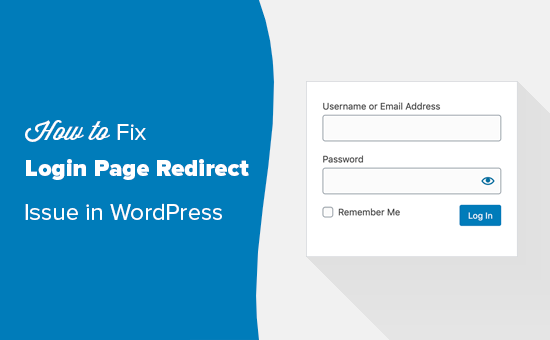
Was verursacht die Login-Seite aktualisieren und Redirect Problem in WordPress?
Der Fehler beim Aktualisieren der WordPress-Anmeldeseite und bei der Weiterleitung (auch WordPress-Login-Weiterleitungsschleife genannt) wird in der Regel durch falsche WordPress-URL-Einstellungen oder das Versäumnis, Login-Cookies zu setzen, verursacht.
Wenn Sie sich anmelden, überprüft WordPress normalerweise Ihren Benutzernamen und Ihr Passwort und setzt dann ein Anmelde-Cookie in Ihrem Browser. Danach leitet es Sie zum WordPress-Dashboard weiter.
Wenn WordPress das Login-Cookie nicht korrekt setzt oder die URL des WordPress-Administrationsbereichs nicht korrekt ist, werden Sie zurück zum Login-Bildschirm anstatt zum Admin-Dashboard geleitet.
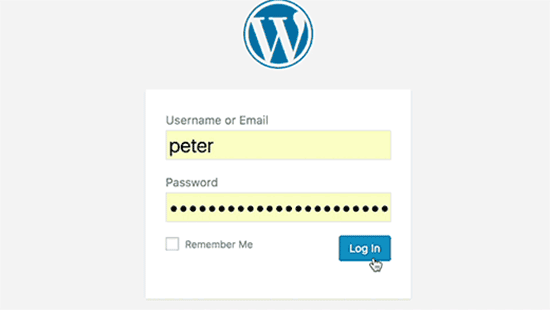
Login-Probleme können auch durch verschiedene WordPress-Fehler verursacht werden, wie z. B. den Fehler beim Aufbau der Datenbankverbindung, einen internen Serverfehler oder den weißen Bildschirm des Todes.
In diesem Sinne, lassen Sie uns das Problem der Umleitung und Aktualisierung der WordPress-Anmeldeseite suchen und beheben. Sie können diese schnellen Links verwenden, um zu einer bestimmten Methode zu springen:
- Method 1: Clear Cookies to Resolve Login Issues
- Method 2: Update WordPress URL Settings
- Method 3: Delete .htaccess File in WordPress
- Method 4: Deactivate Your Plugins
- Method 5: Revert Back to the Default Theme
- Method 6: Reinstall WordPress Core
- Video Tutorial
- What to Do If You Can't Fix WordPress Login Redirect Issue
Hinweis: Wenn Sie die fortgeschrittenen Schritte in diesem WordPress-Tutorial ausprobieren möchten, erstellen Sie bitte zunächst ein Backup Ihrer Website. Siehe unsere Anleitung zur manuellen Erstellung eines WordPress-Datenbank-Backups.
Methode 1: Cookies löschen, um Login-Probleme zu beheben
WordPress verwendet Cookies für die Anmeldeauthentifizierung. Daher ist der erste Schritt bei der Behebung von Problemen mit der WordPress-Anmeldung der einfachste. Sie müssen die Cookies und den Cache Ihres Browsers löschen.
Klicken Sie in Google Chrome einfach auf das Menü “Browsereinstellungen” und wählen Sie dann “Weitere Tools” “Browserdaten löschen“.
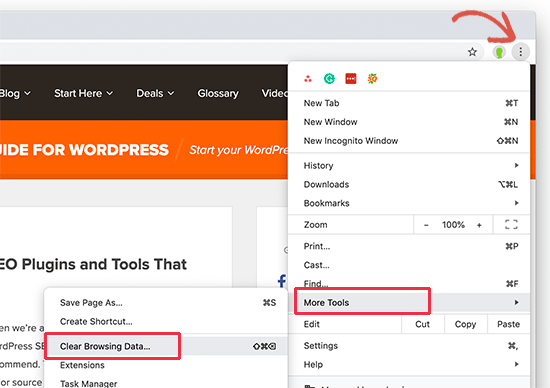
Dadurch wird die Chrome-Einstellungsseite mit einem Popup-Fenster “Browsing-Daten löschen” auf dem Bildschirm angezeigt.
Hier müssen Sie die Optionen “Cookies und andere Websitedaten löschen” und “Bilder und Dateien im Cache” auswählen.
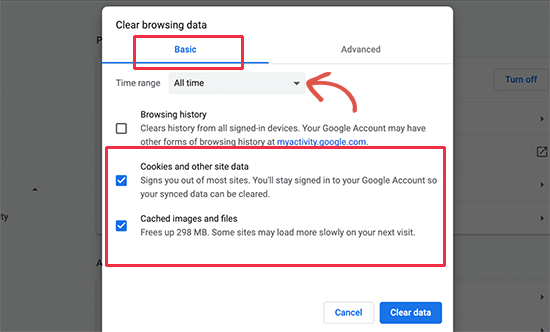
Klicken Sie anschließend auf die Schaltfläche “Daten löschen”, damit Google Chrome den Browser-Cache löscht.
Stellen Sie außerdem sicher, dass in Ihrem Browser Cookies aktiviert sind. Starten Sie danach Ihren Browser neu und versuchen Sie dann, sich anzumelden. Damit sollte das Problem für die meisten Leute behoben sein.
Wir haben eine vollständige Anleitung mit Screenshots, die zeigt, wie man den Cache und die Cookies in allen gängigen Browsern löscht.
Methode 2: WordPress-URL-Einstellungen aktualisieren
WordPress wird mit Einstellungen für die URL Ihrer Website und die URL Ihrer WordPress-Installation geliefert.
Wenn Sie Zugang zu Ihrem WordPress-Administrationsbereich hatten, konnten Sie diese Option auf der Seite Einstellungen ” Allgemein sehen.
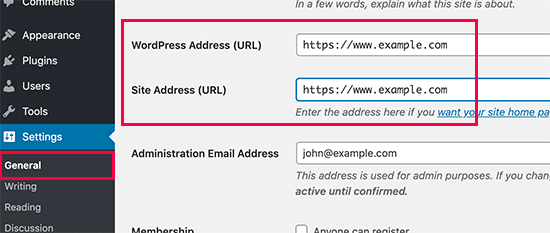
Wenn diese URLs nicht korrekt sind, leitet WordPress Sie zurück auf die Anmeldeseite um.
Da Sie keinen Zugriff auf den WordPress-Administrationsbereich haben, müssen Sie die Datei wp-config.php bearbeiten, um dieses Problem zu beheben.
Die Datei wp-config.php ist eine spezielle Datei in WordPress, die Ihre wichtigen WordPress-Einstellungen enthält. Sie können mit einem FTP-Client oder über die Dateimanager-App in Ihrem WordPress-Hosting-Konto-Dashboard darauf zugreifen.
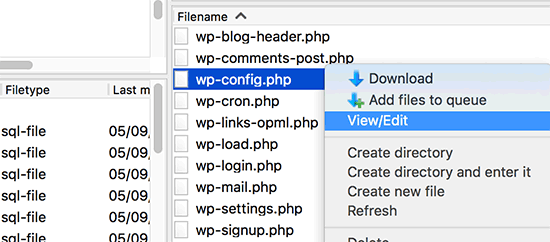
Sie finden die Datei wp-config.php im Stammverzeichnis Ihrer Website. Bearbeiten Sie einfach die Datei und fügen Sie die folgenden Codezeilen ein, direkt vor der Zeile "That's all, stop editing! Viel Spaß beim Veröffentlichen".
1 2 | define('WP_HOME','https://www.example.com');define('WP_SITEURL','https://www.example.com'); |
Vergessen Sie nicht, “example.com” durch Ihren eigenen Domänennamen zu ersetzen.
Danach speichern Sie Ihre Änderungen und laden die Datei wieder auf Ihre Website hoch.
Sie können nun Ihre WordPress-Website besuchen und versuchen, sich anzumelden. Hoffentlich ist das Problem damit für Sie behoben. Sollte dies nicht der Fall sein, lesen Sie weiter, um weitere Schritte zur Fehlerbehebung zu erfahren.
Methode 3: Löschen der .htaccess-Datei in WordPress
Manchmal kann die .htaccess-Datei beschädigt werden, was zu internen Serverfehlern oder einem Fehler bei der Aktualisierung der Anmeldeseite führen kann.
Greifen Sie einfach mit einem FTP-Client oder über die Dateimanager-App im Dashboard Ihres Hosting-Providers auf Ihre Website zu.
Sobald die Verbindung hergestellt ist, suchen Sie die .htaccess-Datei im Stammverzeichnis Ihrer Website und laden Sie sie als Sicherungskopie auf Ihren Computer herunter.
Wenn Sie Ihre .htaccess-Datei nicht finden können, kann Ihnen dieser Leitfaden helfen , warum Ihre .htaccess-Datei fehlen könnte.
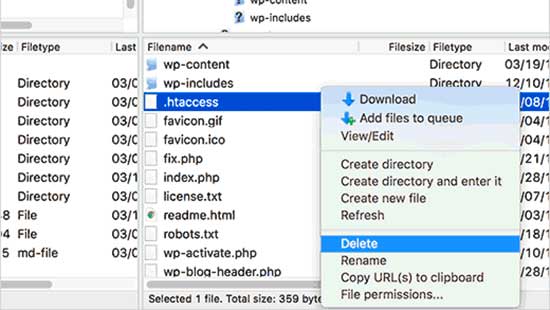
Danach löschen Sie die .htaccess-Datei von Ihrer Website.
Öffnen Sie als Nächstes das wp-admin-Verzeichnis, und wenn sich dort eine .htaccess-Datei befindet, löschen Sie auch diese.
Sie können nun versuchen, sich bei Ihrer WordPress-Website anzumelden. Wenn Sie Erfolg haben, bedeutet dies, dass Ihre .htaccess-Datei Sie daran gehindert hat, sich bei WordPress anzumelden.
Sobald Sie eingeloggt sind, gehen Sie einfach auf die Seite Einstellungen ” Permalinks im WordPress-Administrationsbereich und klicken Sie auf die Schaltfläche “Speichern”, ohne Änderungen vorzunehmen. Dadurch wird eine neue .htaccess-Datei für Ihre Website erstellt.
Methode 4: Deaktivieren Sie Ihre Plugins
Manchmal können WordPress-Plugins dieses Problem verursachen, insbesondere wenn es einen Konflikt zwischen zwei Plugins gibt.
Um alle Ihre WordPress-Plugins zu deaktivieren, verbinden Sie sich mit einem FTP-Client oder über die Dateimanager-App in Ihrem Webhosting-Konto-Dashboard mit Ihrer Website.
Sobald Sie verbunden sind, gehen Sie zum Verzeichnis /wp-content/. Darin finden Sie einen Ordner namens “plugins”. Hier installiert WordPress alle Ihre Plugins.
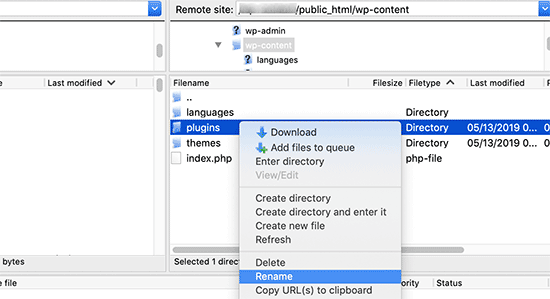
Benennen Sie einfach den Plugins-Ordner in “plugins_backup” um. Dadurch werden alle WordPress-Plugins, die auf Ihrer Website installiert sind, deaktiviert.
Wir haben auch eine ausführliche Anleitung, wie Sie alle WordPress-Plugins deaktivieren können, wenn der WordPress-Admin nicht erreichbar ist.
Sobald Sie alle Plugins deaktiviert haben, versuchen Sie, sich bei Ihrer WordPress-Website anzumelden. Wenn Sie Erfolg haben, bedeutet dies, dass eines Ihrer Plugins das Problem verursacht hat.
Methode 5: Zum Standardthema zurückkehren
WordPress-Themes können auch nach einem Upgrade auf eine neuere Version von WordPress oder des Themes selbst Konflikte verursachen. Um herauszufinden, ob das Problem durch Ihr Theme verursacht wird, müssen Sie es deaktivieren.
Der Vorgang ist ähnlich wie bei der Deaktivierung von Plugins. Stellen Sie mit einem FTP-Client eine Verbindung zu Ihrer Website her. Gehen Sie dann zum Verzeichnis /wp-content/themes/ und benennen Sie Ihr aktuelles Theme-Verzeichnis in “themes_backup” um.
Versuchen Sie dann, sich erneut anzumelden. Wenn Sie Erfolg haben, bedeutet dies, dass Ihr Thema das Problem verursacht hat.
Sie können nun eine neue Kopie Ihres Themes installieren, um zu sehen, ob das Problem dadurch behoben wird. Wenn das Problem erneut auftritt, müssen Sie den Support Ihres Themes kontaktieren oder zu einem anderen WordPress-Theme wechseln.
Methode 6: WordPress Core neu installieren
In seltenen Fällen kann das Problem der ständigen Aktualisierung der Anmeldeseite durch beschädigte WordPress-Kerndateien verursacht werden.
Diese Kerndateien sind die Grundlage Ihrer WordPress-Website und verwalten wichtige Funktionen. Wenn diese Dateien beschädigt oder mit falschem Code überschrieben werden, kann dies zu verschiedenen Fehlern führen, einschließlich Problemen bei der Anmeldung.
Gehen Sie zunächst zu WordPress.org und laden Sie die neueste Version der Software herunter. Nachdem Sie die Datei heruntergeladen haben, entpacken Sie sie auf Ihrem Computer. Dadurch wird ein Ordner mit dem Namen “wordpress” erstellt, der alle erforderlichen Dateien für die Neuinstallation enthält.
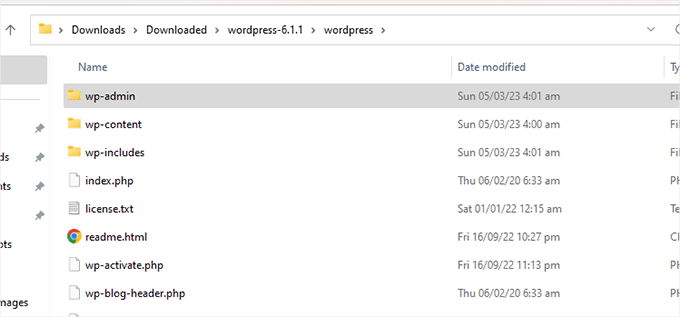
Als Nächstes müssen Sie eine Verbindung zu Ihrer Website herstellen, indem Sie einen FTP-Client oder den Dateimanager Ihres Hosts verwenden.
Sobald Sie verbunden sind, navigieren Sie zum Stammordner Ihrer Website. Dies ist das Hauptverzeichnis, das Verzeichnisse wie wp-admin, wp-content und wp-includes enthält.
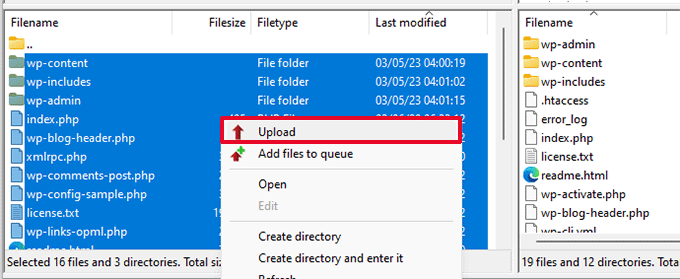
In diesem Stadium nehmen Sie alle Dateien aus dem Ordner “wordpress” auf Ihrem Computer und laden sie in das Stammverzeichnis Ihrer Website hoch.
Ihr FTP-Client wird Sie auffordern, das Überschreiben vorhandener Kerndateien zu bestätigen.
Da Sie beschädigte WordPress-Kerndateien löschen und durch neue ersetzen, wählen Sie “Überschreiben” und die Option “Immer diese Aktion verwenden”, damit Sie nicht jede Datei einzeln bestätigen müssen.
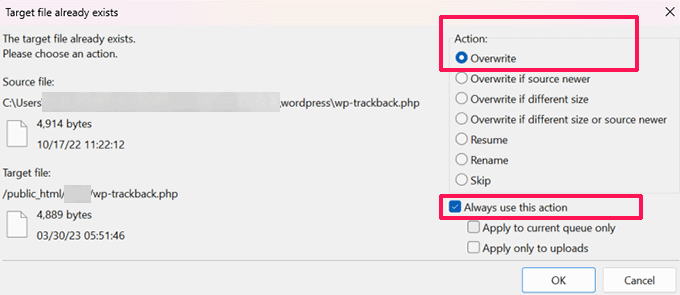
Klicken Sie abschließend auf “OK”, um den Upload-Vorgang zu starten. Ihr FTP-Client wird die WordPress-Kerndateien auf Ihrer Website durch die neuen Dateien von Ihrem Computer ersetzen.
Sobald der Upload abgeschlossen ist, besuchen Sie Ihre Website, um zu sehen, ob der Fehler behoben ist. Wenn das Problem bei der Anmeldung durch eine beschädigte Kerndatei oder Malware verursacht wurde, sollte die Fehlermeldung verschwunden sein und Sie sollten sich erfolgreich anmelden können.
Video-Anleitung
Wenn Sie eine visuelle Anleitung benötigen, sehen Sie sich bitte das folgende Video an.
Was zu tun ist, wenn Sie WordPress Login Redirect Problem nicht beheben können
Wenn Sie alles versucht haben, vom Löschen der Browser-Cookies bis zum Deaktivieren von Themes und Plugins, das Problem aber immer noch besteht, können Sie versuchen, in der WordPress-Community um Unterstützung zu bitten.
Benutzer aus Gruppen wie der WPBeginner Engage Facebook Gruppe haben vielleicht das gleiche Problem wie Sie und können Hinweise geben, was zu tun ist, um die Probleme mit der Login-Seite zu lösen.
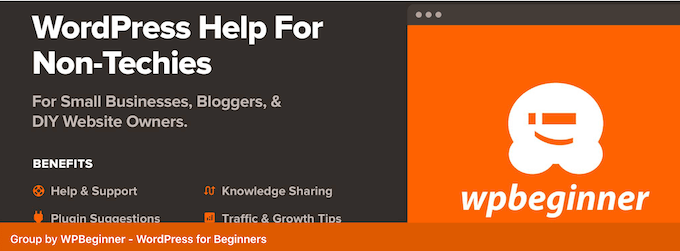
Ansonsten können Sie sich an WordPress-Support-Lösungen wie WPBeginner Pro Services wenden. Wir bieten Premium-WordPress-Support für Notfälle, bei dem Experten herausfinden können, was mit Ihrer Website passiert und die Ursache des Problems beheben.
Sie können auch unsere WordPress-Wartungsdienste in Anspruch nehmen, um zu verhindern, dass Probleme wie Malware, hohe Ausfallzeiten und veraltetes WordPress Ihre Website überhaupt beeinträchtigen.
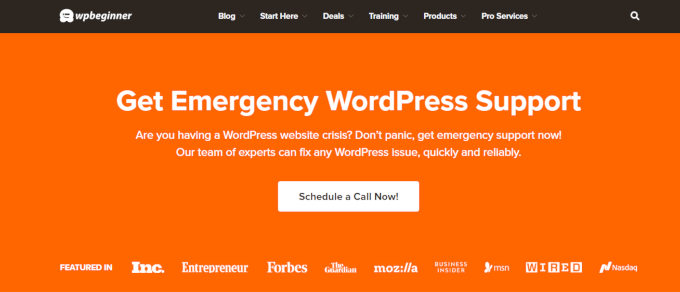
Vereinbaren Sie noch heute einen Termin mit unserem Team, um zu sehen, was wir für Ihre Website tun können.
Erfahren Sie mehr WordPress Problembehandlung Lösungen
Treten bei Ihnen andere häufige WordPress-Fehler auf und müssen Sie einen Weg finden, um sie zu beheben? Hier sind andere Artikel, die Sie sich ansehen können:
- Behebung des Fehlers “Zu viele Weiterleitungen” in WordPress
- Wie man den Fehler “Diese Website kann nicht erreicht werden” in WordPress einfach behebt
- So beheben Sie die Meldung “Die Website hat technische Probleme” in WordPress
- WordPress-Beiträge mit dem Fehler 404 beheben (Schritt für Schritt)
- Wie man den Fehler “Gemischter Inhalt” in WordPress behebt (Schritt für Schritt)
- Wie man den ungültigen JSON-Fehler in WordPress behebt (Anleitung für Anfänger)
- Wie man WordPress-Fehlerprotokolle findet und darauf zugreift (Schritt für Schritt)
- Wie WordPress nicht senden E-Mail Problem zu beheben
- Wie man WordPress im Wartungsmodus hält (Der einfache Weg)
Wir hoffen, dass dieser Artikel Ihnen geholfen hat, das Problem mit dem Aktualisieren und Weiterleiten der WordPress-Anmeldeseite zu lösen. Vielleicht möchten Sie auch unseren vollständigen WordPress-Leitfaden zur Fehlerbehebung lesen oder sich unsere Top-Tipps für die besten WordPress-Plugins und -Tools zur Erweiterung Ihrer Website ansehen.
Wenn Ihnen dieser Artikel gefallen hat, dann abonnieren Sie bitte unseren YouTube-Kanal für WordPress-Videotutorials. Sie können uns auch auf Twitter und Facebook finden.





Eric
I had to rename /wp-content/object-cache.php. Hope that helps for anyone who the other steps don’t work for.
Alisha
When i type myurl.com/wp-admin the page shows blank. I can’t see any login panel either nor does my website opens… what is the cause?
WPBeginner Support
Please see How to fix the WordPress white screen of death.
Admin
Akeem
editing the wp-config worked like a charm. thank you so much!
Jeff
If you are having this issue, and nothing suggested here will work – log into the Cpanel and go into PHP My Admin, run a repair on your database table.
Micah
Adding the code to the wp-config.php solved this for me.
define(‘WP_HOME’,’http://example.com’);
define(‘WP_SITEURL’,’http://example.com’);
Thanks for the article! It took me 3 hours sifting through other posts before I found your post and the resolution that I needed!
Micah
MuhdNurHidayat
Thank you very much! You saved my day!!
Gordon
This problem can also occur if your server hosting WordPress has run out of disk space. Freeing up disk space can solve it.
Victor
You saved my day. I lost hours trying to find what the hell was wrong… thanks dude
Angelo
Deleting the .htaccess worked for me. Thank you
Friday0
Sir please help me look at what am getting it started this night.
Fatal error: Call to undefined function
wp_is_mobile() in /home/u318928021/
public_html/wp-login.php on line 39
I don’t know what to do
WPBeginner Support
Seems like a plugin or your WordPress theme is causing this error. Deactivate all your WordPress plugins and check if this resolves your issue. If it does then you need to reactivate plugins one by one. This will help you find the plugin causing the error. If deactivating all plugins does not resolve the issue, then switch to a default WordPress theme like Twenty Fifteen. If switching theme resolves the issue, then the problem is your with your WordPress theme.
Admin
Luis
Thanks, it was a plugin conflict. I just deleted some useless crap via ftp and now it’s all sorted.
Thomas Le Coz
You guys saved my ass. I was stuck outside a client site after messing with a SSL certificate and some stuff on managed account.
Never encountered this issue before, got saved by your guide.
Thanks
Eva Duli
Nothing of these work for me. I want to work the site localhost but when I am trying to login in the admin it redirects to the old admin login. Do you have any idea?
Marco Panichi
My problem was that I hadn’t renew the database and the provider denied my user to insert/update the database.
The error I received was: “INSERT command denied to user ‘Sqlxxxxxx’@’xx.xxx.xxx.xxx’ for…”
So the solution in my case was:
1) activate the debug into wp-config.php > define(‘WP_DEBUG’, true); in order to discover the problem
2) renew the database
Hope this help!
JohnnZenith
I have a wordpress.com blog and all these instructions either are not relevant or I do not understand them, so I guess i’m going to leave it.
WPBeginner Support
These instructions are for self hosted WordPress.org sites. Please see our guide on the difference between WordPress.com and WordPress.org
Admin
chris
I cant find my .htaccess file? I can find it in my rootfirectory but not on my subdomain (where I have a whole new wordpress site). What do I do? It is my first time ever to log in to my subdomain wordpress.
Kenny
The dreaded Internal Server Error and web host support quickly identified a corrupted .htaccess. Spent next 3 hours trying to find how to use my ImportBuddy when I didn’t have WP Admin access. Finally thought to check WPBeginner, found the .htaccess issue above and 30 seconds later had fixed the issue. Next time I come here first!
Thanks guys and gals.
Drew
Changing the wp-config.php file did it for me! This is the second time I’ve had this issue in two weeks, so I think the fix via htaccess was only a temporary solution.
joel
Seriously a life saver! Corrupted .htaccess files was my issue. But following your steps helped me solve it. Much, much appreciated!
Sumdi
Its working
Have rename .htaccess and update WP_HOME, WP_SITEURL to proper URL in wp-config.php file….
rubenjm
I had this issue, tried all these options and none worked for me.
Finnally solved it… apparently my database was overloaded!! I had to login through phpmyadmin and delete and clean some tables. Hope it helps someone!
Moises
Which tables clean you?
Liviu
I did all of the proposed solutions, but nothing works for me! It keeps refreshing and redirecting it back to the login screen. Changing the folder of my current theme gives the white screen of death. It doesn’t revert to the default theme. Any other idea, please?
Being at a dead end, I’m thinking to download all the site through ftp, make a new one site from WordPress and then upload one by one all my content. I’m worry however if I’ll be able to insert all the customization settings afterwards. The current theme was made custom by another person which cannot help anymore. Is it safe to do that? Thanks!
Mary Anne
Thank you so much. I have WordPress pages built via my account with bluehost. One of my wordpress sites stopped working. I had the white screen of death.
I followed each step in order, until I found the step that worked to resolve my problem. The step that worked for me was, Revert Back To Default Theme. Instead of using an ftp though, because I was having a hard time with my fetch working, I logged into my bluehost account and went into my file manager and then accessed my wpcontent/themes/directory that way for changing the title of my current theme.
this worked perfectly. I was able to log back in and choose a different theme. Thank you again
Mary
Manish
Hello,
Its not working for me. I had made every change into my site as per this tutorial still no luck. Added these two line in web config file.
define(‘WP_HOME’,’http://www.siteurl.com’);
define(‘WP_SITEURL’,’http://www.siteurl.com’);
deleted .htaccess file. but still same problem. My site running on 1&1 hosting.
Please help me.
Thanks
Manish
Umair
Dear manish , there is small change use it will definitely work
1define(‘WP_HOME’,’http://example.com/wp-admin’);
2define(‘WP_SITEURL’,’http://example.com’);
Abdul Ghani
Updating the site URL worked for me!
the wicked noodle
Clearing my cache and cookies fixed it right away. Thanks so much!
Claudia
Update Site URL worked perfect for me! Thank you!
WPBeginner Staff
Contact your web hosting service provider. If they are unable to help then switch to a better WordPress hosting solution.
Louis
Noting work for me… wp 3.9.1, Hostpapa hosting.
WPBeginner Staff
Try checking your server error logs. You can also try increasing php memory limit. Let us know if this helps.
Beck Abad Lastimosa
I have had my site for more than 6 months now and I finally decided to transfer hosting. After the transfer was successfully done, I as still able to access my login page. But these past few days has been a nightmare! I am was able to login to WP under the new DNS but as of this time, this problem suddenly occured:
– Everytime I login to WP admin, I should see the login page right? But what I get is a download of wp-login.php. I have tried checking issues ith the guide of WP Codex. I tried contacting GoDaddy (my new host) but they told me they do not handle coding, etc. Right now, I’m on a dead end! I have tried different browsers but I still get a download of wp-login.php instead of the login page showing itself.
I ould really appreciate it if you can help me.
Thilip kumar
I Check with all the above but unable to login, I can ablre to see the login window, after I submitting login form. I Displays ‘.’ (Dot symbol)
Alison Withers
You’re a godsend!!! Editing the config file to define the site address again did the trick.
Jaka
YES! This did it for me too. Magic! Thanks!
Isak
Did all of the above, nothing works. My main wp-login.php redirects me to one of my subdomains.
This is how the redirect problem occured:
1. My web hotel shut down my site, saying that it had been infected with malware.
2. I changed all my passwords via PhpMyAdmin as well as to the database.
3. I manually updated WP in my root directory as well as 2 out of 3 subdomains (the 3rd one already had the latest version) by uploading the new files and replacing the old ones, since I was not allowed to access my WP admin area.
4. I manually added a .htpasswd and .htaccess to my root WP install and tried to access wp-login.php. I tried my 3rd subdomain (the one with the latest install of WP) first and it worked. After that, I tried my main domain and came to a page saying “update database”, so I did. After that I tried again, but every time I try to reach my root install or any of the other subdomains, I get redirected to my 3rd subdomain.
Any ideas?
WPBeginner Support
Open the wp-config.php file on the root site. Add these two lines to your wp-config.php file:
define('WP_HOME','http://example.com');define('WP_SITEURL','http://example.com');1-click Use in WordPress
Replace example.com with your own domain. Also delete .htaccess file from all your subdomains and root domain. Once you get access to WordPress admin area on your root domain you need to go to Settings -> Permalinks and just save your permalink structure.
Admin
Jesse
Deleting .htaccess file from root directory worked for me. Thank you!!!
Moaz
none worked for me!
Diane
The extra lines in the wp-config worked! I love you! Thanks
carl
WP-config worked for me too! I could kiss you!
Jonny
WP_SITEURL did it for me. Seems illogical but it worked, so thanks for the tip! This only started happening recently to me – I wonder if it’s more prevalent with subdirectory installs with newer versions of WP.
igor
ok I deleted all plugins and it works but whenever I add any plugin it does the same thing
Anna
Thank You
It was really helpful, great info … Resolved y issue by adding site name in wp-config.
Regards,
Peter Evans
Recently WP started getting me to login ever 5 of so minutes. I noticed that my wp-config.php did not have the following lines
define(‘WP_HOME’,’http://example.com’);
define(‘WP_SITEURL’,’http://example.com’);
and when i inserted then the need to login was a less but I was then told that my session has expired and I needed to relogin in.
This is very frustrating and I would be greatful if you could assist me. I am using WP 3.6.1
Peter Evans
Aamna
and Yes if your wp-config.php file does not provide you a solution.
Try going to functions.php of your theme via ftp and add same two lines right below the <?php line and upload again. here you go !!!
it works for me
Aamna
Thanx a lot the site URL was the solution … Thank you Thank you Thank you
W.J.Kok
I use Epic Browser for testing because that browser will not store cookies (by default). Therefore clearing the caches will not delete all my stored passwords in the process.
W.J.Kok
Set chmod wp-admin at 750 did kill my admin login access. So, now I use 755.
Brent Norris
Had a special case of the redirects all day. This particular post, out of about 20 keyed me in on a solution. Just wanted to say, “thanks!” Your perspective was a refresh after ten hours chasing down a solution.
It was the part about generating a new .htaccess file that made the difference for me. Wish I could be more helpful to others but the problem I was having wasn’t very related and wouldn’t make a lot of sense to your readers.
Aloha
Editorial Staff
So glad that we were able to help you Brent
-Syed
Admin
Adrian
Thanks a lot for the ‘Update Site URL’ fix. That solved an issue I was battling with for a while and saves me from any further headaches.
Omar
This was really frustrating me but thanks to your tip on updating the URL my site is now working. Thanks!
Haseeb Ahmad Ayazi
This error is very rear with WordPress but mostly occir in Blogger
Paul
I normally get this error when working with multisite, normally it’s a cookie path problem which can be fixed by changing the wp-config.php.
Robert Connor
I really needed this tutorial it happens to me all the time usually a plug in conflict. I am addicted to plugins. Thanks staff! Have a great day on purpose…
Kartik eye
I had the same issue, few days ago. I was trying to enable the wpmultisite function for my new website with sub directories. My website is hosted on bluehost. I did everything step by step. But after editing all the files like wpconfig.php and htaccess. When I finally tried to login, I was getting a redirect to the same wp login page. I disabled the multiste and then everything was fine again. Please can you help with this?
lelebon
I tried everything — I said every little advice here — to no avail. Until I noticed I was using wp_config.php instead of wp-config.php. That simple! It solved my problem. HURRAY!!
Anyways, thanks for the tips. Hope I can help someone too.